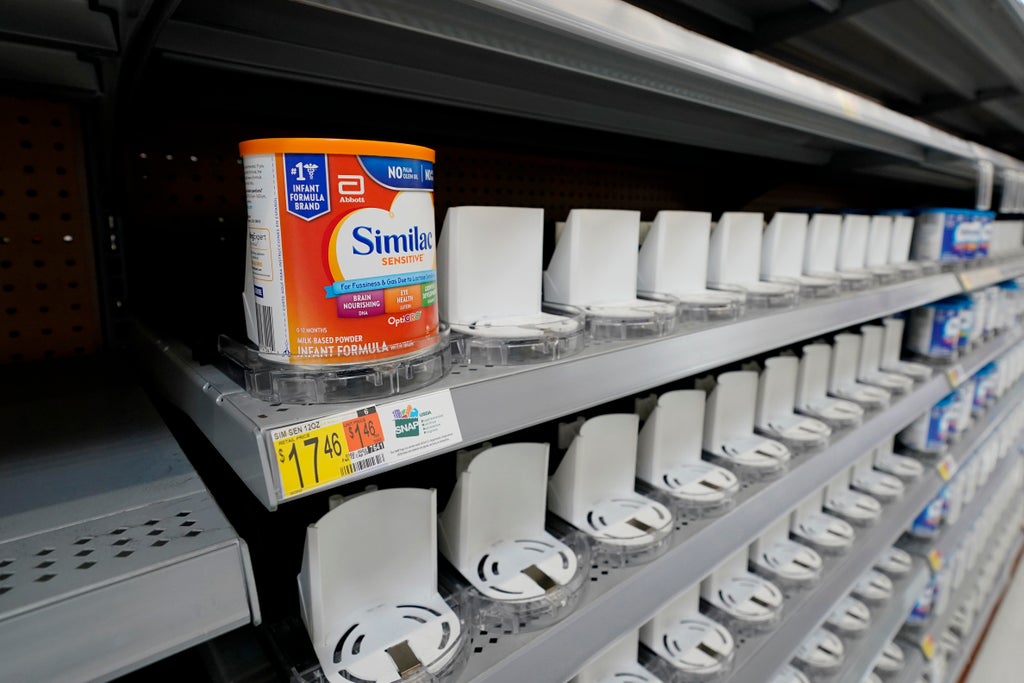
An escalating baby formula shortage has forced desperate parents to pay up to $120 for a single can while top retailers Target, CVS and Walgreens have limited sales in efforts to share out supply.
Families across the US are scrambling to find formula to feed their babies as the shortage reaches crisis levels, fuelled by both supply chain issues and a widespread product recall of one of the nation’s top manufacturers.
A staggering 40 per cent of the top-selling baby formula were out of stock across US retailers in the week ending 24 April, according to analysis from Datasembly.
In six states – Iowa, South Dakota, North Dakota, Missouri, Texas and Tennessee – more than half of all baby formula products are completely sold out.
The dire situation marks a dramatic surge in out-of-stock levels since the start of the month, when almost a third (31 per cent) of products were out of stock, and almost four times the level of shortage (11 per cent) back in November.
This time last year, Datasembly found that out-of-stock levels fluctuated between around 2 and 8 per cent.
What’s behind the shortage?
The shortage has been driven in part by the recent recall of Abbott Nutrition’s popular powdered baby formula products back in February.
The voluntary recall came after two babies died and at least four others were hospitalised with bacterial infections after consuming the formula that was produced in its factory in Sturgis, Michigan.
The US Food and Drug Administration (FDA) warned parents not to use certain Similac, Alimentum and EleCare products made by the huge manufacturer and said it is investigating consumer complaints.
Abbott said in a statement that none of its products were positive for Cronobacter sakazakii or Salmonella and that a review had indicated that the formula produced at its Sturgis facility “is not likely the source of infection in the reported cases and that there was not an outbreak caused by products from the facility”.
However the company acknowledged that the recall had “further exacerbated an industry-wide infant formula supply shortage”.
As a result, it is taking steps to try to combat the shortage including by prioritising production of infant formula products across the US and shipping in products from its facility in Cootehill, Ireland, on a daily basis to help replenish supply.
Aside from the Abbott recall, shortages are also being driven by supply chain issues and rising inflation.
Major retailers are responding by limiting the number of products that customers can buy in an effort to try to ensure that there is enough to go around.
Both CVS and Walgreens announced that they are limiting customers to three toddler and infant formulas per purchase across all US stores.
Walgreens Boots Alliance spokesman Steve Cohen said in a statement that the move was necessary.
“Due to increased demand and various supplier challenges, infant and toddler formulas are seeing constraint across the country,” he said.
Target has also limited purchases to up to four items at a time on its online store.
While panicked parents clamour to find enough to feed their infants and store shelves are increasingly bare, many are also coming up against huge price hikes.
One Texan mother Ashley Hernandez told the New York Times that she turned online and found a single can of the baby formula her two daughters have on eBay for $120.
In the end, she found a seller offering 10 cans for $40 each and, despite the high price, quickly bought it.
However, she said the supply will only last them around five or six weeks and then she will be back to square one.







